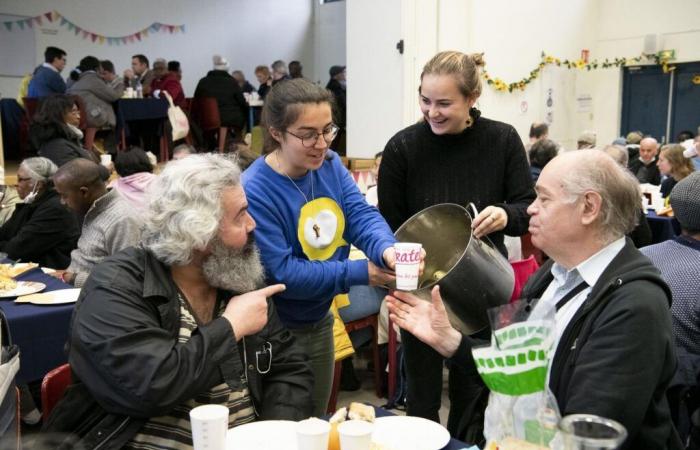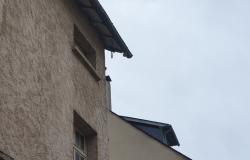
Committed, but not always visible. These are the Catholics that the organizers of the second edition of the Builders' Dinner want to highlight, which will be held in Paris this Thursday, November 14. To show that, despite the decline of Catholicism in France, the faithful remain a force of commitment in society, in all areas of solidarity, both among the most deprived, migrants, the elderly, as well as prisoners or still patients in palliative care. According to an Ifop survey carried out for the Builders' Dinner and including The Cross reveals the results, they are more engaged than the average French person.
Carried out among 2,005 people, 42% of whom define themselves as having no religion and 44% Catholics, this study in fact found a slightly larger proportion of volunteers among the latter. Thus, 30% of them say they have participated in at least one voluntary activity over the last two years, a little more than all French people in the general population (27%). Moreover, Catholics are, along with Protestants (Reformed and Evangelicals combined), the subgroup most frequently engaging in voluntary activities. One in five Catholics (22%) get involved in volunteering at least once a week and one in five also once a month.
An image of impartiality to maintain
Is there really a correlation between faith and commitment? The Ifop survey tends to demonstrate this. According to the results, 56% of Catholics say that their religious beliefs make them “encourage one to (engage) in the service of others”. And the more believers, all religions combined, attend religious services, the more they engage in voluntary activities: 51% of believers participating in a religious service at least once a month have volunteered over the last two years, compared to two times less for those who go there only for special occasions (weddings, funerals).
But what precisely do these Catholics involved in aid networks for the most vulnerable in France represent today? Difficult, if not impossible, to quantify. The associations, holding on to their image of impartiality which gives them credibility, do not have data on the religious affiliation of their volunteers. Some, contacted by The Cross, don't even want to bring up the subject. “Non-denominational organizations, dependent on fundraising, can be very nervous about being referred to a religious affiliation, explains Johanna Siméant-Germanos, professor of political science specializing in engagement. They may be afraid of being attacked for proselytizing, criticized in the public space for hiding a religious reference, privileging certain audiences or undermining secularism. »
A few sensors still shed light on the omnipresence of Catholics in associations. Conducting an investigation within the NGOs Médecins du monde and Médecins sans frontières in the early 2000s, Johanna Siméant-Germanos was struck by the number of former scouts among the volunteers.. “By investigating a specific environment, we have confirmation that Catholic socialization can be very structuring in commitments,” she elaborates.
The Catholic presence is more evident in certain sectors, such as in palliative care services. “If Catholics are a minority in society, they are over-represented in all structures. Without them, these services would no longer exist”bluntly asserts Erwan Le Morhedec, lawyer and volunteer with the Jeanne-Garnier Medical Center.
This phenomenon is explained, according to him, by “a conscious or unconscious, instinctive link”, between faith and care for the sick. “There is in faith the conviction that the other remains worthy when he appears unworthy (…). Behind this, I have the feeling that there is a necessary form of love, beyond compassion and kindness. »
“A fervent and joyful religiosity”
In parish involvement and Catholic associations, obviously, the faith of volunteers is more visible. To Catholic Relief, “more than half of the 5,000 volunteers who responded to an internal questionnaire make a link between their commitment and faith or Christian values”, explains Matthieu Fontaine, head of the association's volunteer network.
Investigating parish marauding in Paris, researcher Erwin Flaureau was also surprised by the dynamism of the faithful: “Maraudes constitute for young Catholics an activity offering them the opportunity to live and witness to a fervent and joyful religiosity. »
Another good indicator of the commitment of the baptized: the place of Catholic associations in the social assistance landscape. “They are essential for public authorities”, analyzes Jean Buyssens, researcher specializing in religious social assistance in France. “Today we are witnessing a recomposition of public action around them, which could seem paradoxical in view of secularization. »
He points to multiple reasons: “Associations like the Saint-Vincent-de-Paul Conference draw their legitimacy from their historical establishment, but also from their financial, real estate or volunteer resources. »
In Paris, the Church is a key player in solidarity
Example in Paris, where the diocese is a major player in solidarity. “Hiver solidaire”, its operation to house street people, is mobilizing 43 parishes and 3,200 volunteers this year. And around 2.5 million meal equivalents are distributed this year by parishes, or almost 23% of the capital's food aid, according to the diocese.
“The diocese is an integral part of the network of social action in Paris”, greets Léa Filoche, deputy mayor of Paris and responsible for solidarity. “Luckily they’re here!” » Beyond their weight, the elected official values their vision of solidarity, which is similar to hers: “We can clearly see that the commitment of Catholics is real and above all unconditional. This dimension is precious because it is not always easy to assume: it means that we help everyone, without being in the sorting, suspicion or verification. »
It is through their secularized values, their professionalism and the absence of proselytism that Catholic associations have acquired their credibility with their non-denominational partners. “With Catholic Relief, for exampletestifies Jean-François Corty, president of Médecins du monde, it is our humanist, united and non-partisan values that connect us. »
—————–
Forms of commitment by religion
According to the Ifop survey for the “Builders’ Dinner”, almost half (47%) of those who define themselves as Muslims indicate having carried out voluntary activity over the last two years, the highest proportion of all religions. However, only 5% of Muslims say they volunteer every week.
A third (31%) of those who define themselves as Protestant, evangelical and Reformed combined, say they carry out a weekly voluntary commitment, much more than Catholics (22%) and those “without religion” (18%).
Those who answered that they did not belong to any religion were the most likely to say they had not participated in a voluntary activity in the last two years (76%).
The study also shows that those who define themselves as Catholic are proportionately the least likely to give money to associations (53%), while more than six Muslims in ten and 60% of Protestants make at least one donation per year. .





